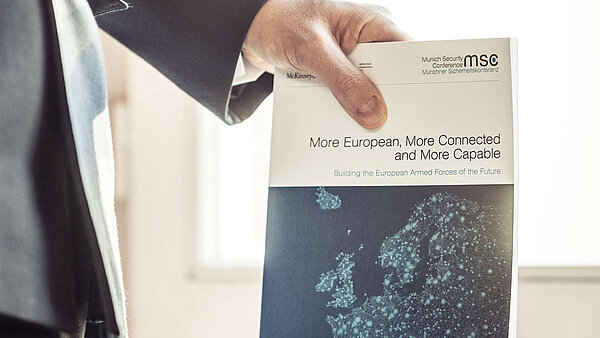
Louise Mushikiwabo speaks at the Hertie School in a post-Munich Security Conference discussion.
“Africa should play a much, much bigger role in terms of peace and security” in the world and should be represented on the United Nations Security Council, Rwandan Minister of Foreign Affairs Louise Mushikiwabo told an audience at the Hertie School on 19 February, in a follow-up discussion to the weekend’s Munich Security Conference.
Mushikiwabo offered her perspectives on security, Africa and Africa’s relationship to Europe. Wolfgang Ischinger, Senior Professor for Security Policy and diplomatic Practice at the Hertie School, chaired a discussion following her keynote speech. Ischinger is also director of the school’s Centre for International Security Policy (CISP) and Chairman of the Munich Security Conference. Hertie School President Helmut K. Anheier gave opening remarks.
Ischinger asked Mushikiwabo how African countries would resolve the issue of filling a seat on the Security Council – which country would represent the continent. Although he noted that such a decision was not imminent, he said he supported the idea: “I happen to be the first to agree that it is an unfortunate and ahistoric and therefore an overdue change to have better African representation on that body. But how do we get from here to there?”
Listen to Mushikiwabo’s full comments on the Security Council issue in a podcast.
“Africa should have two seats and they should be permanent,” Mushikiwabo said, but she expressed doubt that the five countries on the Security Council were interested in reform. The world of 2018 is vastly different from 1945 when the body was established, and it is time for others to have a say on the Council, she said. As to who would represent Africa, Mushikiwabo said Rwanda and a few other countries believed there should be a seat representing Africa as a whole, decided by the African Union.
“My country and a few other countries that I know – their position is that if there is a seat or two, it should be seat of Africa, not the seat of a particular country. We feel that Africa through the African Union – a much more strong and organised entity – would have to manage – most likely on a rotational basis,” she said.
Mushikiwabo outlined the African Union’s plans for development and reforms aimed at self-sufficiency, prosperity and stability, and at giving it a stronger voice in decision-making on the world stage. Concretely, these include a levy on luxury goods imports that goes to a peace fund managed by the AU; prioritising and implementing decisions that the AU has taken; identifying topics on which the continent can “speak with one voice”; and taking the work of the AU to citizens by furthering integration, with projects like a free trade area and open skies agreements.
She also addressed the tragic circumstances of migrants stuck in Libya, where people are being bought and sold “like cattle,” she said. Africa has to offer migration within the continent that is “…legal, organised and definitely not dangerous for people looking for a better life.” Rwanda, for example, has agreed to take in migrants and is looking at ways to offer them a longer-term perspective, she said.
“We have a world characterised by immense opportunities, where innovation is flourishing, where social media has shrunk the world and given the average person a lot of power – a very democratic tool –that provides information, provides analysis, but that can also be diverted for the wrong cause and reasons,” she said. “This tells me that we live in a world where we need each other more – where words such as collaboration, cooperation, partnership should be given value, because no single nation can deal with these single issues alone.”
Looking at the recent G20 “Compact for Africa”, Mushikiwabo said she was hopeful that this would be a new beginning in for building partnerships and redefining old roles. “Africa has to organise its governance, take care of its citizens,” she said. And Europe has to “stop looking at Africa like a child.”
Prior to serving as Foreign Minister, Mushikiwabo served as the Minister of Information in the Government of Rwanda. She lived in the United States for 22 years, then briefly in Tunisia, before joining the Rwandan Cabinet in March 2008. She is the co-author of Rwanda Means the Universe (St. Martin’s Press, 2006) an intergenerational socio-historical memoir.



